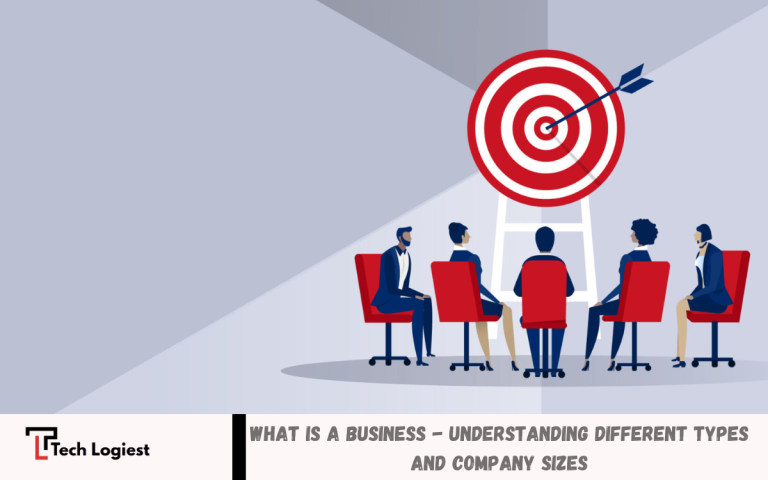A business is an organized effort by individuals or groups to produce and sell goods or services to earn a profit. Economy by creating jobs, generating income, and meeting consumer needs. Whether it’s a small local bakery or a global tech company, every business starts with an idea and grows through planning, strategy, and hard work.
Businesses come in different types, including sole proprietorships, partnerships, corporations, and limited liability companies (LLCs). Each type has its structure, legal requirements, and benefits. For example, a sole proprietorship is simple and easy to start, while a corporation offers more protection but involves complex regulations and compliance requirements.
Company sizes also vary—from micro and small businesses with a handful of employees to large enterprises with thousands of workers and global operations. The size of a company affects how it operates, its market reach, and the way it handles finances and responsibilities.
What Is a Business?
A business is any organized effort where individuals or groups produce, sell, or provide goods and services to earn a profit. It can range from a small home-based bakery to a multinational corporation. At its core, a business meets the needs or wants of customers in exchange for money.
Businesses are an integral part of our daily lives—whether you’re buying a cup of coffee, getting a haircut, or using a mobile app, you’re interacting with a business. While making a profit is often the primary goal, businesses also create jobs, support communities, and drive innovation in society.
A business typically involves a few key elements:
- Product or service being offered
- Customers or clients who need or want it
- Operations to manage production and delivery
- Financial transactions (buying and selling)
Whether run by a single person or a large team, businesses follow established rules and strategies to remain successful and competitive in their respective industries. Understanding what a business is—and how it functions—is the first step for anyone interested in entrepreneurship, economics, or career development.
Key Characteristics of a Business
Every business, regardless of its size or type, shares specific core characteristics that define its operations. Here are the key features that make an activity a business:
Economic Activity
A business involves the production or exchange of goods and services for a monetary value. Its main goal is to create economic value.
Profit Motive
While not all businesses are focused solely on profit, most aim to earn income. Profit is the reward for taking risks and running operations efficiently.
Production or Distribution
Businesses either produce goods (such as cars or clothing) or provide services (like consulting or delivery). Some do both.
Organized Structure
A business must have an organized system, comprising people, processes, and resources that work together to achieve its goals.
Customer Satisfaction
A successful business focuses on meeting the needs and expectations of its customers. Without customers, no business can survive.
Continuity and Regularity
Business is not a one-time activity. It involves continuous and regular transactions to maintain operational continuity.
Risk and Uncertainty
Every business involves some level of risk, such as changes in market trends, competition, or unexpected costs.
Legal Compliance
Businesses must comply with laws and regulations, including registering with relevant authorities, paying taxes, and meeting safety and labor standards.
Understanding these characteristics helps clarify how a business differs from a hobby or a one-time transaction.
Read Also: DeepSeek faces expulsion from Apple, Google app stores in Germany
Types of Businesses
Businesses can be classified based on their ownership structure and operational model. Understanding these types helps entrepreneurs choose the correct setup based on their goals, resources, and risk tolerance.
Sole Proprietorship
This is the simplest and most common type of business. It is owned and managed by a single person.
- Pros: Easy to start, low cost, complete control
- Cons: Unlimited personal liability, limited capital
Partnership
A business owned by two or more people who share profits, losses, and responsibilities.
- Pros: Shared resources and skills, more capital
- Cons: Shared liability, potential for conflicts
Corporation
A legal entity separate from its owners (shareholders), offering limited liability protection.
- Pros: Limited liability, easy to raise funds, continuous existence
- Cons: More regulations, higher setup and maintenance costs
Limited Liability Company (LLC)
A hybrid structure that combines features of both partnerships and corporations.
- Pros: Limited liability, flexible management, fewer formalities
- Cons: May have limited life depending on state laws
Cooperative (Co-op)
Common in agriculture, retail, and housing.
- Pros: Shared ownership, democratic control
- Cons: Slower decision-making, limited profit motive
Each type of business has its own legal, tax, and operational implications. Choosing the right one depends on your vision, team size, and long-term plans.
Frequently Asked Questions
What is limited liability?
Limited liability means that the owners’ assets are protected if the business incurs debts or faces legal issues.
Do I need to register my business?
Yes, most businesses are required to be registered with local or national authorities, depending on their location.
What is a business plan, and why is it important?
A business plan outlines your goals, strategy, finances, and operations. It’s essential for staying organized and attracting investors.
How do businesses make money?
They earn revenue by selling products or services, and profit is the amount that remains after expenses are paid.
Can I start a business with little or no money?
Yes, many businesses begin small with limited funds, especially those operating online or in the service sector. Planning and creativity are key.
Conclusion
Understanding what a business is—and the different types and sizes it can take—lays a strong foundation for anyone looking to start, grow, or simply learn more about the world of commerce. Whether you dream of owning a small shop, joining a partnership, or building a large corporation, understanding the basics helps you make informed, intelligent decisions. Each business type has its unique benefits and challenges, and the size of a company significantly impacts how it operates and competes.

